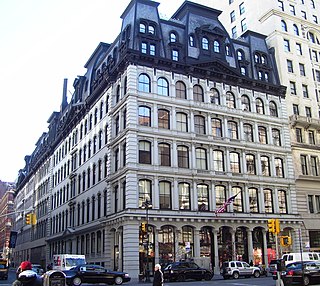Related Research Articles
Dominion was a national chain of supermarkets in Canada, which was known as the Dominion of Canada when the chain was founded. The chain was founded in 1919 in Ontario and was later acquired by the Argus Corporation. It was later sold to The Great Atlantic & Pacific Tea Company (A&P), which restricted the chain to the Greater Toronto Area. Stores outside Ontario were converted to the A&P banner or sold to third parties. A&P's Canadian division was later acquired by Metro Inc., which rebranded the remaining Dominion stores to its namesake banner in 2008.

South Coast Plaza is a regional shopping mall in Costa Mesa, California. The largest shopping center on the West Coast of the United States, its sales of over $1.5 billion annually are the highest in the United States. Its 275 retailers represent the highest concentration of design fashion retail in the U.S., with the second highest sales-volume in California at $800 per square foot ($8,600/m2)—second only to Westfield Valley Fair in San Jose-Santa Clara, at $809 per square foot ($8,710/m2). The national average is $411 per square foot ($4,420/m2). The mall is anchored by three Macy's stores, Nordstrom, Bloomingdale's, and Saks Fifth Avenue. The South Coast Plaza is the largest shopping mall in California and the 4th largest in the United States.

The Manhattan Mall is an indoor shopping mall in New York City located at 33rd Street and Sixth Avenue in the heart of Midtown Manhattan and home to dozens of well-known retailers.

Dillard's Inc. is an American luxury department store chain with approximately 289 stores in 29 states and headquartered in Little Rock, Arkansas. Currently, the largest number of stores are located in Florida with 42 and Texas with 57. The company also has stores in 27 more states; however, it is absent from the Northeast, most of the Upper Midwest, the Northwest, and most of California, aside from three stores in smaller cities.
Gayfer's was a regional department store chain in the southern United States. Based in Mobile, Alabama, the chain of stores operated from 1879 until 1998 when it was taken over by Dillard's.
The William H. Block Company was a department store chain in Indianapolis and other cities in Indiana. It was founded in 1874 by Herman Wilhelm Bloch, an immigrant from Austria-Hungary who had Americanized his name to William H. Block. The main store was located at 9 East Washington Street in Indianapolis in 1896. The company also identified itself as The Wm. H. Block Co., and Block's.
Jenss was a small chain of department stores in Western New York State. The company was founded in 1887 by the Jenss brothers in Lockport, New York. In 1951, Harold Dautch bought the company. In 1962, the company opened its flagship department store at the Boulevard Mall in Amherst, New York. Other locations were: Summit Park Mall, Eastern Hills Mall, and Main Street in Niagara Falls. It also operated the Jenss Twin Ton location at Main and Niagara streets in downtown Tonawanda (city), New York, the former Zuckmaier Brothers department store. In 1997, the company decided to close its Summit Park Mall Location. On September 15, 2000, Jenss closed all of its department stores. In 2002, Jenss, while remaining a separate company, chose to open stores exclusively with Reeds Jewelers. No merger took place, and the companies retain separate and distinct operations.

Adam, Meldrum & Anderson Company (AM&A's) was a chain of department stores based in Buffalo, New York. It was an institution to generations of shoppers in the Buffalo area. The company remained family owned until its sale to The Bon-Ton in 1995.

Franklin Simon & Co. was a department store chain specializing in women's fashions and furnishing based in New York City. The store was conceived as a collection of specialty shops rather than a traditional U.S. dry goods store. Each "shop" had a specialty product line, such as ready-to-wear apparel for women, misses, girls, boys, men, young men and infants. When the chain closed in 1979, there were 42 stores.

The Mall at 163rd Street is an enclosed shopping mall and power center in North Miami Beach, Florida. From its opening as an open-air shopping center in 1956, it has been converted into an enclosed mall, but was later redeveloped as a combination of both formats. The mall's anchors are The Home Depot, Marshalls, Ross, and Wal-Mart Supercenter.

The Plaza, formerly known as Evergreen Plaza, was a shopping mall in Evergreen Park, Illinois, United States. It was legally organized by Arthur Rubloff, who is also credited with coining the phrase "Magnificent Mile" describing the upscale section of Michigan Avenue north of the Chicago River to Oak Street. Rubloff secured the funding for the Evergreen Plaza from the Walgreen family who lived nearby in Beverly, Chicago. The Evergreen Plaza operated from 1952 to 2013. It featured over 120 stores, as well as a food court.
Oppenheim Collins was a major women's specialty clothing store, headquartered in New York City, New York.
Southwest Plaza is an enclosed shopping mall in unincorporated Jefferson County, Colorado, immediately south of Denver. Littleton, Colorado is commonly indicated in the mall's postal address because its ZIP code is primarily associated with that city, which lies some two miles east. The mall has two levels with over 150 stores and a food court.

Randhurst Village, previously known as Randhurst Mall and Randhurst Center or simply Randhurst, is a shopping mall located at the corner of Rand Road and Elmhurst Road in Mount Prospect, Illinois. The mall took its name from combining the names of these two roads.
Sattler's was a regional department store chain headquartered at 998 Broadway, Buffalo, New York, two miles (3 km) from the downtown core. They pioneered "bargain basement" retailing in the Buffalo area. Sattler's was founded in 1889 by 17-year-old John G. Sattler when he opened a one-room shoe store in his mother's home at 992 Broadway. That store would eventually become Sattler's main store which, by 1950, covered 6 acres (24,000 m2) and included the 365,000-square-foot (33,900 m2) flagship store. In the late-1920s the store introduced a number of innovative marketing and promotional schemes to attract customers such as weekly automobile giveaways and high wire walkers. They also resold the contents of bankrupt stores purchased in railcar lots called the "Bargain Train". Starting in 1947, they sponsored an annual Santa Claus parade.
The Sample, also known as The Sample Dress Shop or The Sample Shop, was a family-owned, high end department store specializing in upscale ladies clothing and furnishings based in Buffalo, New York. The original store was established by Anne W. Bunis on Hertel Avenue in North Buffalo in 1928. The company started when Mrs. Bunis returned from a trip to New York City with a set of 48 "sample" dresses, which she in turn sold for $12.75 each. Expansion occurred during the early 1950s with stores at Lancaster, New York; Lockport, New York; Thruway Plaza in Cheektowaga, New York; South Buffalo at 2182 Seneca Street; and Downtown Buffalo at 554 Main Street, the former home of Flint & Kent. The Downtown Buffalo store closed in 1959. In 1961, a store opened in Amherst, New York and in 1969, a store opened at Seneca Mall in West Seneca, New York. In 1971, a store opened at Eastern Hills Mall, with another store opening up at the Summit Park Mall in 1972, and in 1985, a store opened in McKinley Mall in Hamburg, New York. The last store in the then 11-store chain opened in 1988 at Walden Galleria in Cheektowaga, New York. In 1990, following the death of company chairman Maer Bunis, the company began a rapid descent into bankruptcy. On January 13, 1991, the flagship Hertel Avenue store closed.
Twin Fair, Inc. was a discount department store chain based in Buffalo, New York. It was incorporated on March 22, 1956, and the first store opened on Walden Avenue. By 1959, four stores were in operation and sales stood at $2.5 million. In 1962, the founders sold the company to Unexcelled Chemicals, Corp., and also expanded the chain to include groceries. The company continued to expand opening an eighth store in 1967 on Seneca Street, along with stores in Connecticut and Cincinnati, Ohio. By 1970, through expansion and acquisition, the chain grew to 37 stores located primarily in New York and Ohio. The Ohio stores were later sold to Meijer, which briefly converted them to a concept called Meijer Square. In 1978, they added Hens & Kelly to their portfolio.
The Summit, formerly Summit Park Mall, was an enclosed shopping mall in Wheatfield, New York. Opened in 1972, the mall became largely vacant by the late 1990s. It underwent renovations in 2004 and 2005 which added new anchor stores and tenants, but after the mall's developers filed for bankruptcy protection in 2009, the complex was closed except for three anchor stores: Sears, The Bon-Ton and Save-A-Lot, with two more vacant anchors last occupied by Steve & Barry's and a Macy's closeout store. As of September 2017, Save-A-Lot has closed permanently, leaving only Sears and The Bon-Ton still open in the mall. On April 18, 2018, it was announced that The Bon-Ton would be closing in August 2018. as it is going out of business leaving Sears as the only tenant left. On May 7, 2018, Sears announced that would also be closing in August 2018 which will leave the mall with no tenants.
References
- ↑ ""Victorian Buffalo: Images From the Buffalo & Erie County Public Library" Hens and Kelly store in 1911". Archived from the original on 2006-09-01. Retrieved 2005-12-23.